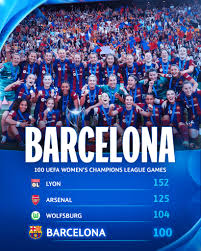The Evolution and Significance of Women’s UCL

Introduction
The UEFA Women’s Champions League (UCL) has emerged as a vital platform for showcasing female football talent globally. As the top-tier club competition in European women’s football, it plays a crucial role in promoting gender equality and empowering women athletes. The growth of the Women’s UCL is reflective of the increasing popularity of women’s sports and the commitment from governing bodies to enhance visibility and support for female players.
Growth of Women’s UCL
Since its inception in the 2001-02 season, the Women’s UCL has steadily evolved, growing from a less-recognised tournament to a highly competitive league that captivates millions of fans. With clubs like Lyon, Wolfsburg, and Barcelona leading the charge, the quality of football has significantly improved. In the 2023 season, a record number of 76 teams participated, illustrating the expanding interest and talent across Europe.
Recent Developments
This year’s competition has been particularly noteworthy. Lyon, with their illustrious history, continues to dominate, having won the title multiple times and setting a high standard for other teams. However, the rise of FC Barcelona has contributed to an exciting competitive landscape, with them reaching the final in 2021 and revitalising interest globally, notably after their historic performance in the 2022 league season, where they scored 30 goals, showcasing their scoring prowess.
Moreover, UEFA has recognised the need to foster a vibrant ecosystem for women’s football, implementing initiatives such as increased funding for clubs and enhanced broadcasting rights. This includes partnerships with major broadcasters to ensure matches reach wider audiences, thereby engaging more fans.
Importance and Future Outlook
The impact of the Women’s UCL extends beyond the pitch. It serves as a beacon for young girls aspiring to pursue careers in sport, thus encouraging participation at grassroots levels and fostering talent from a young age. The tournament not only showcases top-class football but also inspires a new generation of female athletes.
With the UEFA Women’s Euro 2022 generating record attendance and viewership, it is clear that interest in women’s sports is on the rise. Experts predict that the next few years will see further expansion of the Women’s UCL, potentially moving towards club professionalisation and greater financial investment, which can enhance competitiveness and sustainability within the league.
Conclusion
The Women’s UCL is not just a football tournament; it represents a significant cultural shift towards inclusivity in sports. As it gains momentum, it continues to empower women and promote equality within the sporting realm. The bright future of the Women’s UCL promises to inspire more participation, encourage diversity, and improve the visibility of women’s football globally.








